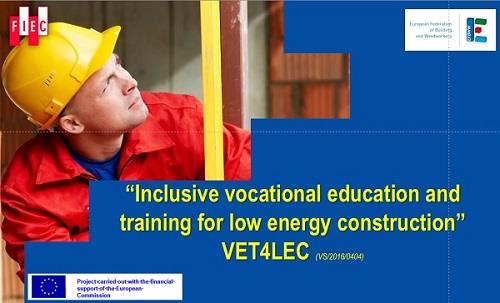This project was jointly promoted by FIEC and the EFBWW in the framework of the EU sectoral Social Dialogue for the construction industry and was carried out from 2016 to 2019.
The Energy Performance of Buildings Directive (EPBD-2010/31/EC) requires all new buildings to be nearly zero energy buildings (NZEB) by 2020, with major implications for vocational education and training (VET) in construction. Low energy construction (LEC) calls for a different set of knowledge, skills and competences (KSC) to be deployed, as revealed in the Build Up Skills (BUS) investigation, which found that existing VET needs upgrading to incorporate a deeper knowledge and understanding of energy efficiency, higher technical skills, and a holistic approach to the building process. The cross-occupational co-ordination demanded implies inter-disciplinarity, broad occupational profiles and transversal abilities, including problem solving and communication.
The EU sectoral social partners for the construction industry, FIEC (European Construction Industry Federation) and EFBWW (European Federation of Building and Wood Workers) therefore decided to launch this project with the aim of assessing the existing situations in the various countries and of developing guidelines and recommendations for improvements.
On the basis of the information collected in the 10 participating countries (Belgium, Bulgaria, Finland, Germany, Hungary, Ireland, Italy, Poland, Slovenia, Spain) the main aims of the project were to :
- evaluate different approaches to developing and delivering VET for low energy construction;
- provide criteria for curricula development and outline components of a core energy literacy curriculum compatible with the European policy tools;
- develop guidelines and recommendations on how to address the weaknesses identified.
Approaches to VET for low energy construction vary considerably, though countries face similar challenges and all need to ensure that VET is effective for meeting NZEB requirements, incorporates low energy construction-related KSC, and is sufficiently broad to cover transversal abilities and cross-occupational understanding. Deep integration of energy literacy into existing occupational profiles, curricula or syllabuses at all levels is preferable to just adding low energy construction-related topics onto IVET (initial VET) programmes. CVET (continuous VET) for low energy construction presents a challenge, particularly in the short term, as short courses and a range of delivery methods are needed, catering to different existing training and qualifications levels. Course content must be carefully considered, where possible specific modules should be part of a comprehensive and longer CVET programme, and funding is essential for providing an upgraded, comprehensive and accessible VET programme. Factors hindering VET for low energy construction development and undermining efforts to achieve an integrated construction process need to be addressed, including limited work-based learning opportunities, low VET participation by the self-employed and small firms, low construction VET currency and fragmented organisation of work on site.
The outcomes of the project will now be used both at the EU level, by FIEC and EFBWW, as well as at the national level, by the concerned social aprtners and training providers, in order to identify and develop further common initiatives.
Final report of the European project VET 4 LEC


Recent Comments